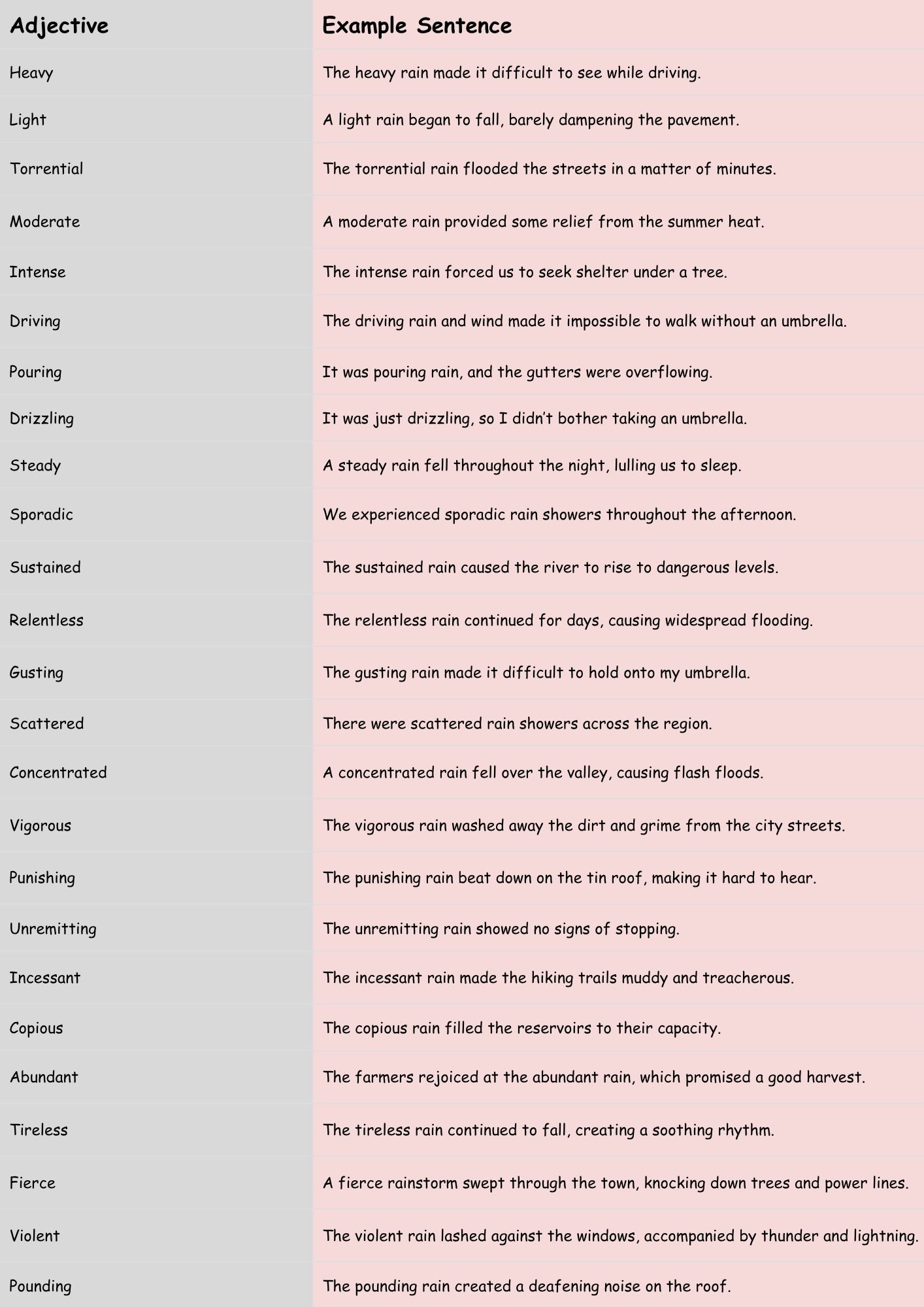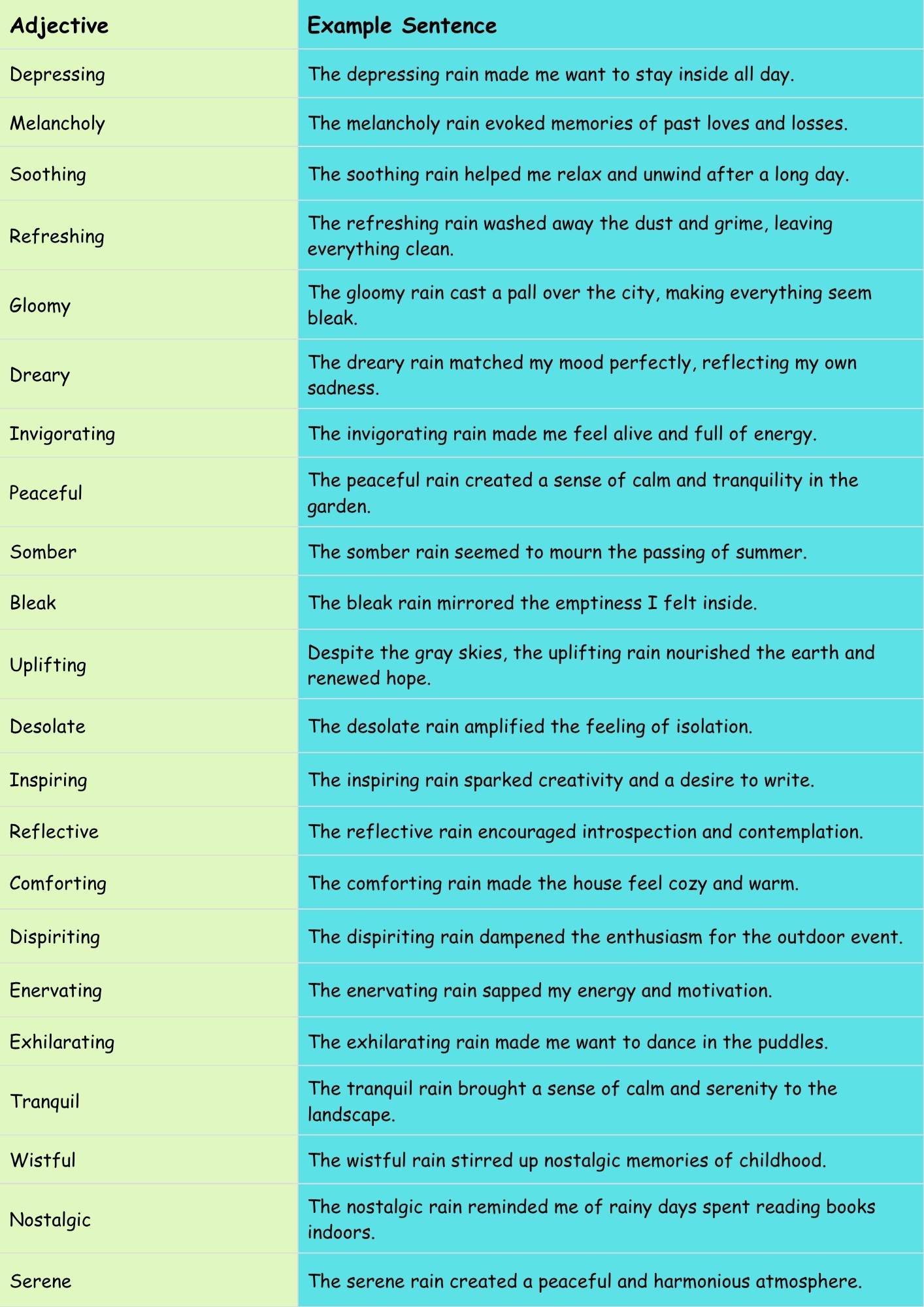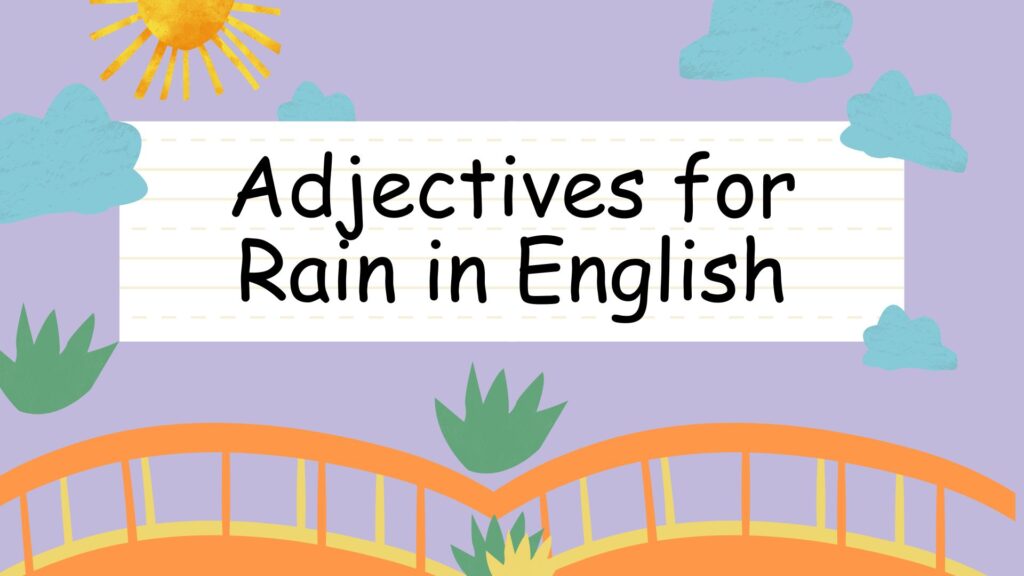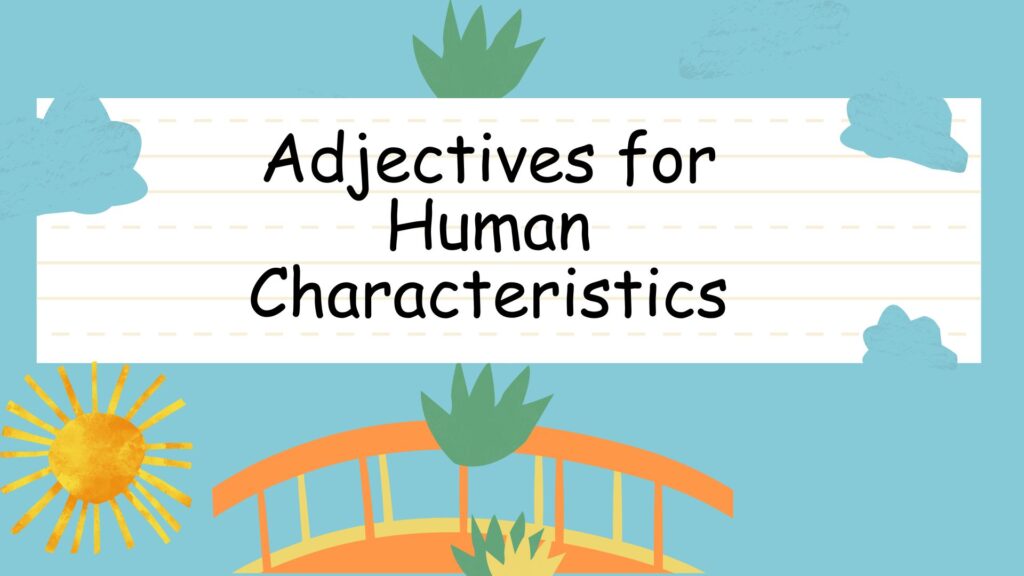Rain, a meteorological phenomenon, is a common topic in conversations, literature, and daily life. Using precise and descriptive adjectives to describe rain can significantly enhance your communication skills and make your writing more vivid. This article explores a wide range of adjectives that capture the nuances of rain, from its intensity and duration to its emotional impact. Mastering these adjectives will not only enrich your vocabulary but also improve your ability to express yourself with greater accuracy and creativity. This guide is suitable for English language learners of all levels, writers, and anyone interested in expanding their descriptive abilities.
Whether you are describing a gentle drizzle or a torrential downpour, this article will provide you with the tools to articulate the specific qualities of rain. We will cover various categories of adjectives, including those related to intensity, duration, sound, and emotional impact. By understanding these categories and practicing their usage, you can paint a more accurate and engaging picture of rainy weather.
Table of Contents
- Introduction
- Definition of Adjectives for Rain
- Structural Breakdown
- Types and Categories of Adjectives for Rain
- Examples of Adjectives for Rain
- Usage Rules
- Common Mistakes
- Practice Exercises
- Advanced Topics
- FAQ
- Conclusion
Definition of Adjectives for Rain
Adjectives for rain are descriptive words used to modify nouns related to rain, providing more detail about its characteristics. These adjectives help to convey the specific nature of the rainfall, such as its intensity (e.g., heavy, light), duration (e.g., brief, prolonged), or the sounds it produces (e.g., pattering, thundering). They enhance the clarity and expressiveness of language when discussing or writing about rain.
Adjectives play a crucial role in painting a vivid picture of the weather. They allow us to differentiate between a gentle shower and a severe storm, thus enabling more precise communication. Understanding and utilizing these adjectives effectively is essential for both native English speakers and learners aiming to master the nuances of the language.
Structural Breakdown
Adjectives typically precede the noun they modify. In the phrase “a heavy rain,” the adjective “heavy” comes before the noun “rain.” However, adjectives can also follow a linking verb, such as “is” or “seems,” as in “The rain is relentless.”
Adjectives can be modified by adverbs to further refine their meaning. For example, in the phrase “extremely heavy rain,” the adverb “extremely” intensifies the adjective “heavy.” This allows for even greater precision in describing the rain.
Here’s a breakdown of the common structures:
- Adjective + Noun: heavy rain, gentle shower
- Linking Verb + Adjective: The rain is constant, The drizzle seems endless
- Adverb + Adjective + Noun: incessantly pouring rain, surprisingly light shower
Types and Categories of Adjectives for Rain
Adjectives for rain can be categorized based on the specific aspect of the rain they describe. These categories include intensity, duration, sound, emotional impact, size of raindrops, and accompanying weather conditions. Understanding these categories can help you choose the most appropriate adjective for a given situation.
Adjectives Describing Intensity
These adjectives describe how strong or weak the rain is. Examples include:
- Heavy: indicating a large amount of rain falling quickly.
- Light: indicating a small amount of rain falling gently.
- Torrential: indicating a very intense and heavy downpour.
- Moderate: indicating a rainfall of average intensity.
- Intense: conveying a strong and forceful rain.
- Driving: describing rain that is blown sideways by strong winds.
- Pouring: similar to heavy, indicating a substantial amount of rain.
- Drizzling: indicating a very light and fine rain.
Adjectives Describing Duration
These adjectives describe how long the rain lasts. Examples include:
- Brief: indicating a short period of rain.
- Prolonged: indicating a long-lasting rain.
- Continuous: indicating rain that doesn’t stop.
- Intermittent: indicating rain that stops and starts.
- Persistent: indicating rain that continues for a long time.
- Fleeting: indicating a very short and quick shower.
- Unending: suggesting rain that seems to have no end.
- Constant: similar to continuous, implying rain that doesn’t cease.
Adjectives Describing Sound
These adjectives describe the sounds that the rain makes. Examples include:
- Pattering: describing the soft, light sound of rain.
- Thundering: describing the loud sound of rain accompanied by thunder.
- Drumming: describing the sound of rain hitting a surface forcefully.
- Whispering: describing a very soft, almost silent rain.
- Rattling: describing the sound of rain hitting a hard surface like metal.
- Splashing: describing the sound of rain hitting puddles or other water surfaces.
- Roaring: describing the loud, intense sound of heavy rain.
- Tapping: describing a gentle, repetitive sound of rain.
Adjectives Describing Emotional Impact
These adjectives describe the feelings or emotions that the rain evokes. Examples include:
- Depressing: describing rain that makes one feel sad.
- Melancholy: describing rain that evokes a sense of sadness and reflection.
- Soothing: describing rain that has a calming effect.
- Refreshing: describing rain that feels clean and revitalizing.
- Gloomy: describing rain that contributes to a general feeling of darkness and sadness.
- Dreary: similar to gloomy, suggesting a dull and depressing rain.
- Invigorating: describing rain that feels energizing and uplifting.
- Peaceful: describing rain that creates a sense of calm and tranquility.
Adjectives Describing Size of Raindrops
These adjectives describe the size of the raindrops. Examples include:
- Large: indicating big, noticeable raindrops.
- Small: indicating tiny, fine raindrops.
- Fine: similar to small, describing delicate raindrops.
- Heavy: (in this context) implying large, weighty raindrops.
- Minute: indicating extremely small raindrops.
- Giant: describing exceptionally large and unusual raindrops.
- Tiny: similar to small and fine, indicating very small raindrops.
- Golf-ball sized: (more of a phrase, but descriptive) indicating extremely dangerous hailstones mixed with rain.
Adjectives Describing Accompanying Weather
These adjectives describe other weather conditions that occur with the rain. Examples include:
- Stormy: describing rain that occurs during a storm.
- Windy: describing rain accompanied by strong winds.
- Foggy: describing rain that occurs with fog.
- Misty: describing rain that occurs with mist.
- Cold: describing rain that is cold.
- Warm: describing rain that is warm.
- Freezing: describing rain that freezes upon contact.
- Icy: describing rain that is mixed with ice or sleet.
Examples of Adjectives for Rain
This section provides extensive examples of how to use adjectives to describe rain in various contexts. Each category is presented with a table containing numerous examples to illustrate their usage.
Intensity Examples
The following table showcases adjectives that describe the intensity of rain, providing sentences to illustrate their usage.
| Adjective | Example Sentence |
|---|---|
| Heavy | The heavy rain made it difficult to see while driving. |
| Light | A light rain began to fall, barely dampening the pavement. |
| Torrential | The torrential rain flooded the streets in a matter of minutes. |
| Moderate | A moderate rain provided some relief from the summer heat. |
| Intense | The intense rain forced us to seek shelter under a tree. |
| Driving | The driving rain and wind made it impossible to walk without an umbrella. |
| Pouring | It was pouring rain, and the gutters were overflowing. |
| Drizzling | It was just drizzling, so I didn’t bother taking an umbrella. |
| Steady | A steady rain fell throughout the night, lulling us to sleep. |
| Sporadic | We experienced sporadic rain showers throughout the afternoon. |
| Sustained | The sustained rain caused the river to rise to dangerous levels. |
| Relentless | The relentless rain continued for days, causing widespread flooding. |
| Gusting | The gusting rain made it difficult to hold onto my umbrella. |
| Scattered | There were scattered rain showers across the region. |
| Concentrated | A concentrated rain fell over the valley, causing flash floods. |
| Vigorous | The vigorous rain washed away the dirt and grime from the city streets. |
| Punishing | The punishing rain beat down on the tin roof, making it hard to hear. |
| Unremitting | The unremitting rain showed no signs of stopping. |
| Incessant | The incessant rain made the hiking trails muddy and treacherous. |
| Copious | The copious rain filled the reservoirs to their capacity. |
| Abundant | The farmers rejoiced at the abundant rain, which promised a good harvest. |
| Tireless | The tireless rain continued to fall, creating a soothing rhythm. |
| Fierce | A fierce rainstorm swept through the town, knocking down trees and power lines. |
| Violent | The violent rain lashed against the windows, accompanied by thunder and lightning. |
| Pounding | The pounding rain created a deafening noise on the roof. |

Duration Examples
The following table provides examples of adjectives that describe the duration of rain, allowing you to specify how long the rainfall lasts.
| Adjective | Example Sentence |
|---|---|
| Brief | A brief rain shower passed through, leaving a rainbow in its wake. |
| Prolonged | The prolonged rain caused the river to overflow its banks. |
| Continuous | The continuous rain made it difficult to plan outdoor activities. |
| Intermittent | We experienced intermittent rain throughout the day, with sunny spells in between. |
| Persistent | The persistent rain soaked everything, making it feel damp and cold. |
| Fleeting | A fleeting rain shower cooled the air for a moment before disappearing. |
| Unending | It felt like the unending rain would never stop. |
| Constant | The constant rain made the roads slippery and dangerous. |
| Lasting | The lasting rain ensured that the plants received ample hydration. |
| Temporary | The temporary rain was a welcome break from the heat. |
| Passing | A passing rain cloud darkened the sky briefly. |
| Sustained | The sustained rain filled the reservoirs to capacity. |
| Interminable | The interminable rain made everyone feel gloomy. |
| Lingering | A lingering rain kept the city shrouded in mist. |
| Extended | The extended rain period helped alleviate the drought. |
| Drawn-out | The drawn-out rain made the commute a nightmare. |
| On-going | The on-going rain forced the cancellation of the outdoor concert. |
| Lengthy | The lengthy rain period was a boon for local farmers. |
| Chronic | The chronic rain led to widespread flooding in the low-lying areas. |
| Perpetual | It felt like the city was under a spell of perpetual rain. |
| Unbroken | An unbroken rain continued for days, testing the patience of the residents. |
| Unceasing | The unceasing rain caused landslides in the mountainous regions. |
| Everlasting | It seemed like an everlasting rain, dampening spirits and delaying projects. |
| Incessant | The incessant rain made it difficult to dry clothes indoors. |
Sound Examples
The following table provides examples of adjectives that describe the sound of rain, helping you to convey the auditory experience of rainfall.
| Adjective | Example Sentence |
|---|---|
| Pattering | The pattering rain on the roof was soothing and lulled me to sleep. |
| Thundering | The thundering rain accompanied by lightning was quite frightening. |
| Drumming | The drumming rain on the metal awning was almost deafening. |
| Whispering | The whispering rain was barely audible, a gentle sound against the leaves. |
| Rattling | The rattling rain against the windows woke me up in the middle of the night. |
| Splashing | The splashing rain created puddles that reflected the city lights. |
| Roaring | The roaring rain made it impossible to hear anything else. |
| Tapping | The tapping rain on the windowpane was a gentle reminder of the storm outside. |
| Hissing | The hissing rain sizzled as it hit the hot pavement. |
| Clattering | The clattering rain echoed through the empty streets. |
| Murmuring | The murmuring rain created a peaceful atmosphere. |
| Humming | The humming rain vibrated through the trees. |
| Echoing | The echoing rain resounded in the narrow alleyways. |
| Resonating | The resonating rain amplified the sounds of the storm. |
| Pulsating | The pulsating rain had a rhythmic sound that was hypnotic. |
| Staccato | The staccato rain sounded like a rapid series of taps. |
| Rhythmic | The rhythmic rain created a soothing background noise. |
| Melodic | The melodic rain seemed to compose a tranquil symphony. |
| Harmonious | The harmonious rain blended with the wind to create a calming chorus. |
| Rumbling | The rumbling rain, accompanied by distant thunder, heralded the storm’s approach. |
| Booming | A booming rain, heavy and intense, shook the windows of the house. |
| Crashing | The crashing rain created a dramatic and overwhelming soundscape. |
| Pitter-patter | The gentle pitter-patter rain on the skylight was incredibly relaxing. |
Emotional Impact Examples
The following table showcases adjectives that describe the emotional impact of rain, showing how rain can affect our feelings and mood.
| Adjective | Example Sentence |
|---|---|
| Depressing | The depressing rain made me want to stay inside all day. |
| Melancholy | The melancholy rain evoked memories of past loves and losses. |
| Soothing | The soothing rain helped me relax and unwind after a long day. |
| Refreshing | The refreshing rain washed away the dust and grime, leaving everything clean. |
| Gloomy | The gloomy rain cast a pall over the city, making everything seem bleak. |
| Dreary | The dreary rain matched my mood perfectly, reflecting my own sadness. |
| Invigorating | The invigorating rain made me feel alive and full of energy. |
| Peaceful | The peaceful rain created a sense of calm and tranquility in the garden. |
| Somber | The somber rain seemed to mourn the passing of summer. |
| Bleak | The bleak rain mirrored the emptiness I felt inside. |
| Uplifting | Despite the gray skies, the uplifting rain nourished the earth and renewed hope. |
| Desolate | The desolate rain amplified the feeling of isolation. |
| Inspiring | The inspiring rain sparked creativity and a desire to write. |
| Reflective | The reflective rain encouraged introspection and contemplation. |
| Comforting | The comforting rain made the house feel cozy and warm. |
| Dispiriting | The dispiriting rain dampened the enthusiasm for the outdoor event. |
| Enervating | The enervating rain sapped my energy and motivation. |
| Exhilarating | The exhilarating rain made me want to dance in the puddles. |
| Tranquil | The tranquil rain brought a sense of calm and serenity to the landscape. |
| Wistful | The wistful rain stirred up nostalgic memories of childhood. |
| Nostalgic | The nostalgic rain reminded me of rainy days spent reading books indoors. |
| Serene | The serene rain created a peaceful and harmonious atmosphere. |

Size of Raindrops Examples
The following table showcases adjectives that describe the size of raindrops, allowing you to paint a more detailed picture of the precipitation.
| Adjective | Example Sentence |
|---|---|
| Large | Large raindrops splattered against the windshield, making it difficult to see. |
| Small | Small raindrops created a fine mist as they fell, barely wetting the ground. |
| Fine | The fine rain was almost invisible, like a veil of moisture in the air. |
| Heavy | Heavy raindrops pounded the pavement, creating a deafening roar. |
| Minute | Minute raindrops clung to the spiderwebs, creating a shimmering effect. |
| Giant | Giant raindrops fell sporadically, like tears from the sky. |
| Tiny | Tiny raindrops danced on the surface of the pond, creating ripples. |
| Golf-ball sized | The storm brought golf-ball sized hail mixed with rain, causing significant damage to cars and roofs. |
| Pinhead | Pinhead raindrops barely registered on the skin, a mere tickle of moisture. |
| Bean-sized | Bean-sized raindrops fell with surprising force, bouncing off the pavement. |
| Marble-sized | Marble-sized raindrops pelted the garden, threatening to damage the delicate flowers. |
Accompanying Weather Examples
The following table provides examples of adjectives that describe other weather conditions that occur with the rain, allowing you to provide a more comprehensive description of the weather.
| Adjective | Example Sentence |
|---|---|
| Stormy | The stormy rain was accompanied by thunder and lightning, creating a spectacular display. |
| Windy | The windy rain blew sideways, making it impossible to stay dry even with an umbrella. |
| Foggy | The foggy rain created a mysterious and ethereal atmosphere. |
| Misty | The misty rain softened the edges of the landscape, creating a romantic scene. |
| Cold | The cold rain chilled me to the bone, despite my warm coat. |
| Warm | The warm rain felt pleasant on my skin, like a gentle embrace. |
| Freezing | The freezing rain turned to ice as soon as it hit the ground, creating treacherous conditions. |
| Icy | The icy rain stung my face and made it difficult to see. |
| Snowy | The snowy rain was a rare and beautiful sight, a mix of winter and spring. |
| Hazy | The hazy rain obscured the distant mountains, creating a sense of mystery. |
Usage Rules
When using adjectives for rain, it’s important to consider the context and the specific nuance you want to convey. Here are some general rules:
- Placement: Adjectives usually come before the noun they modify. For example: “Heavy rain.”
- Linking Verbs: Adjectives can follow linking verbs like “is,” “are,” “was,” “were,” “seems,” and “appears.” For example: “The rain is heavy.”
- Multiple Adjectives: You can use multiple adjectives to describe rain, but be mindful of the order. Generally, adjectives of opinion come before adjectives of fact. For example: “A beautiful, heavy rain.”
- Adjective Order: When using multiple adjectives, follow this general order: opinion, size, physical quality, shape, age, color, origin, material, and type. For example: “The heavy, cold rain.”
Common Mistakes
Here are some common mistakes to avoid when using adjectives for rain:
- Incorrect Adjective Choice: Choosing an adjective that doesn’t accurately describe the rain. For example, using “torrential” when the rain is just a light drizzle.
- Misplaced Adjectives: Putting the adjective in the wrong place in the sentence. For example, saying “Rain heavy” instead of “Heavy rain.”
- Redundancy: Using adjectives that have similar meanings, making the description repetitive. For example, saying “heavy, pouring rain.”
- Incorrect Adjective Form: Using the wrong form of the adjective. For example, using “heavier” instead of “heavy” when describing the general intensity of rain.
Here are some examples of correct and incorrect usage:
| Incorrect | Correct | Explanation |
|---|---|---|
| Rain heavy | Heavy rain | Adjective should precede the noun. |
| Very torrential and heavy rain | Very torrential rain | Avoid redundancy by using only one adjective with similar meaning. |
| The rain is heavily | The rain is heavy | Use the adjective form, not the adverb form, after a linking verb. |
Practice Exercises
Test your understanding of adjectives for rain with these exercises. Choose the best adjective from the options provided to complete each sentence.
Exercise 1: Choose the correct adjective to describe the intensity of the rain.
| Question | Options | Answer |
|---|---|---|
| 1. The ____ rain made it hard to see while driving. | a) light, b) heavy, c) drizzling | b) heavy |
| 2. A ____ rain began to fall, barely dampening the pavement. | a) torrential, b) moderate, c) light | c) light |
| 3. The ____ rain flooded the streets in a matter of minutes. | a) light, b) heavy, c) torrential | c) torrential |
| 4. An ____ rain provided some relief from the summer heat. | a) intense, b) moderate, c) driving | b) moderate |
| 5. The ____ rain and wind made it impossible to walk without an umbrella. | a) drizzling, b) driving, c) pouring | b) driving |
| 6. It was ____ rain, and the gutters were overflowing. | a) pouring, b) drizzling, c) light | a) pouring |
| 7. It was just ____, so I didn’t bother taking an umbrella. | a) pouring, b) drizzling, c) heavy | b) drizzling |
| 8. A ____ rain fell throughout the night, lulling us to sleep. | a) sporadic, b) steady, c) intense | b) steady |
| 9. We experienced ____ rain showers throughout the afternoon. | a) sustained, b) steady, c) sporadic | c) sporadic |
| 10. The ____ rain caused the river to rise to dangerous levels. | a) sustained, b) light, c) intermittent | a) sustained |
Exercise 2: Choose the correct adjective to describe the duration of the rain.
| Question | Options | Answer |
|---|---|---|
| 1. A ____ rain shower passed through, leaving a rainbow in its wake. | a) prolonged, b) brief, c) continuous | b) brief |
| 2. The ____ rain caused the river to overflow its banks. | a) brief, b) prolonged, c) intermittent | b) prolonged |
| 3. The ____ rain made it difficult to plan outdoor activities. | a) continuous, b) fleeting, c) temporary | a) continuous |
| 4. We experienced ____ rain throughout the day, with sunny spells in between. | a) constant, b) intermittent, c) persistent | b) intermittent |
| 5. The ____ rain soaked everything, making it feel damp and cold. | a) fleeting, b) persistent, c) unending | b) persistent |
| 6. A ____ rain shower cooled the air for a moment before disappearing. | a) fleeting, b) constant, c) sustained | a) fleeting |
| 7. It felt like the ____ rain would never stop. | a) unending, b) temporary, c) passing | a) unending |
| 8. The ____ rain made the roads slippery and dangerous. | a) constant, b) intermittent, c) brief | a) constant |
| 9. The ____ rain ensured that the plants received ample hydration. | a) temporary, b) lasting, c) fleeting | b) lasting |
| 10. The ____ rain was a welcome break from the heat. | a) temporary, b) constant, c) sustained | a) temporary |
Exercise 3: Fill in the blank with an appropriate adjective for rain.
| Question | Answer |
|---|---|
| 1. The ____________ rain on the roof was strangely soothing. | Pattering |
| 2. The ____________ rain made it difficult to see the road ahead. | Heavy |
| 3. The ____________ rain seemed to last forever. | Unending |
| 4. The ____________ rain was a welcome change after the long drought. | Refreshing |
| 5. The ____________ rain created a peaceful atmosphere in the forest. | Gentle |
Advanced Topics
For advanced learners, consider exploring the use of metaphorical adjectives and more nuanced descriptions. For example, instead of “heavy rain,” you could say “the rain was a liquid curtain.” This uses a metaphor to create a more vivid image.
Explore the use of compound adjectives (e.g., “never-ending rain”) and consider how cultural contexts influence the perception and description of rain. Different cultures may have unique adjectives to describe rain that reflect their specific environment and experiences.
Additionally, delve into literary examples of how famous authors have described rain. Analyze their word choices and the impact those choices have on the reader’s experience.
FAQ
What is the difference between “heavy rain” and “torrential rain”?
Heavy rain indicates a substantial amount of rain falling quickly, while torrential rain implies a very intense and heavy downpour, often associated with flooding and severe conditions.
Can I use more than one adjective to describe rain?
Yes, you can use multiple adjectives to provide a more detailed description. For example: “The cold, heavy rain.” Just be mindful of the order and avoid redundancy.
How do I choose the best adjective for rain?
Consider the specific characteristic of the rain you want to emphasize. Is it the intensity, duration, sound, emotional impact, or something else? Choose an adjective that accurately reflects that characteristic.
Are there any adjectives that should be avoided when describing rain?
Avoid using adjectives that are vague or overused, such as “bad” or “nice.” Instead, opt for more descriptive and specific adjectives that convey the unique qualities of the rain.
How can I improve my vocabulary of adjectives for rain?
Read widely, paying attention to how authors describe rain in their writing. Use a thesaurus to find synonyms for common adjectives. Practice using new adjectives in your own writing and conversations.
Conclusion
Mastering adjectives for rain is a valuable skill that can enhance your ability to communicate effectively and expressively in English. By understanding the different categories of adjectives and practicing their usage, you can paint a more vivid and accurate picture of rainy weather. This not only enriches your vocabulary but also improves your overall language proficiency.
Continue to explore and experiment with different adjectives to discover new and creative ways to describe the many facets of rain. With practice, you’ll be able to articulate the nuances of rainfall with confidence and precision.



